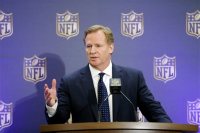It came like the saddest, most annoying specter of the night: on Monday afternoon, a federal appeals court re-suspended Tom Brady for Deflategate. You remember that unbearably asinine thing, right?
I’m not here to rehash why I think the decision was wrong, the faulty science or how this just gives Brady and the Patriots a second shot at making everybody uncomfortable by getting the Lombardi Trophy from Goodell — or that Jimmy Garoppolo is primed to take up the mantle of “incredibly attractive Patriots starting quarterback.” No, this is about Roger Goodell.
The NFL and the Player’s Association Collective Bargaining Agreement essentially gives Goodell the power to be judge, jury and executioner in any matter pertaining to the integrity and image of the league, which is as vague as it sounds. He even plays the role of the appeals court, which is where things get dicey. Goodell was initially lauded as the savior of the NFL’s image for suspending players who hurt the NFL’s image like Adam “Pacman” Jones.
But somehow, it is in dealing with deflated footballs where he went too far. Tom Brady will be suspended for as long as Greg Hardy was for allegedly (and really only technically so) beating his girlfriend. Now, Goodell initially tried to make it longer, but following appeal, he dropped it to four games. But when Brady appealed, Goodell stood fast due to evidence not included in the “independently” conducted Wells Report (Ted Wells had just finished negotiating the NFL’s new multi-billion dollar television deal before being tapped for the investigation).
This unmentioned evidence was one of the sticking points for the dissenting judge in the appeal case, Hon. Robert Katzmann. In his opinion, he points out “the Collective Bargaining Agreement… requires the Commissioner to provide a player with notice of the basis for any disciplinary action and an opportunity to challenge the discipline in an appeal hearing.” The Wells Report concluded that Brady was “generally aware” of the deflation of balls below league-mandated levels, but Katzmann believes that the punishment far exceeded this decision, saying, “the Commissioner was doling out his own brand of industrial justice.”
There are now four federal judges who are split as to how he can, with two saying his decision were in line with the CBA, and the others saying he willfully overstepped his bounds.
It’s important to point out that the suspension of Brady in and of itself was gratuitous. Goodell could have stopped at docking the Patriots of their first round draft pick this season. It was only the second time a team has lost a draft pick, and the other time was also the Patriots — for Spygate. But instead, Goodell followed the court of public appeal and went for the jugular with the suspension.
Roger Goodell is an incredible businessman. He’s helped the most unstoppable sports empire somehow grow even bigger, seemingly by the day. But he is an absolutely terrible disciplinary force. He routinely doles out unseemly suspensions, only to have them thrown in his face. If Brady does decide once again to pursue appealing his suspension, the United States Supreme Court, of all places, could potentially take Goodell to task. While it is ridiculous that something that started over a discrepancy of half a pound of air pressure in a football could end up as a Supreme Court case, that’s not what this is about any more. It’s about setting limits on unnecessarily absolute power.
This suspension could end up like a JR Smith 28-footer: Goodell pulled up for the ultimate heat check, drilled it, but now it might be overturned for a third time on review and everyone will forget why they liked him in the first place.
While the suspension may stand for now, the unmitigated power of Goodell needs to be checked, whether by federal courts or when it’s time for a new CBA in 2021.





